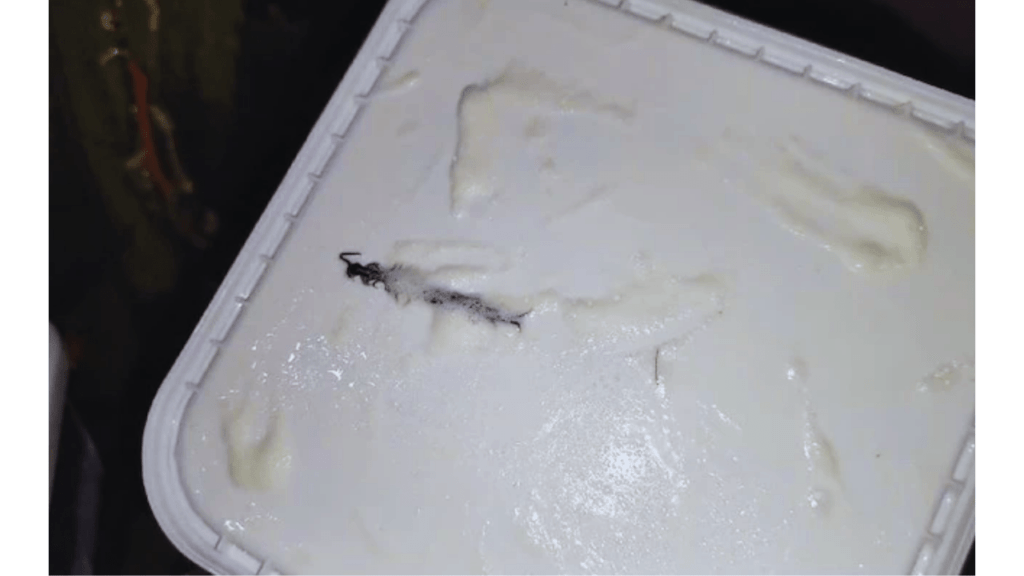
In a chilling reminder of the potential hazards lurking in our food supply chain, a woman in Noida discovered a dead centipede in her vanilla ice cream purchased online. This unsettling incident has sparked a significant outcry, shedding light on the critical need for stringent food safety measures in both manufacturing and delivery processes.
On June 15, Deepa Devi, a resident of Noida Sector-12, ordered an Amul vanilla ice cream tub via the popular online grocery delivery platform, Blinkit. Anticipating a delightful treat, she was horrified to find a frozen, dead centipede inside the ice cream upon opening it. Deepa promptly shared her shocking discovery on social media, posting a video that quickly went viral.
Blinkit, in response to the viral video, promptly reimbursed Deepa’s money and initiated an investigation. Amul, a household name in dairy products, also reached out to Deepa, assuring her of a thorough probe into the matter.
As part of the investigation, a team from the local food department reviewed Deepa’s video and visited her residence for questioning. The officials then inspected the Blinkit store in Sector-22, where the tainted ice cream tub had been sourced. During their inspection, they found significant dust accumulation, raising serious questions about the store’s hygiene standards. Samples of the vanilla ice cream were collected and sent for analysis to determine if other tubs were similarly contaminated.
Raising Questions on Food Safety
This alarming incident underscores the urgent need for rigorous food safety protocols at every stage of the supply chain. From manufacturing to storage and delivery, each step must adhere to strict hygiene standards to prevent such occurrences. The presence of a dead centipede in a trusted brand like Amul’s product calls for a thorough review of their quality control measures.
The contamination at the Blinkit store also highlights the vulnerabilities in the storage and handling of food products by online grocery platforms. Ensuring clean and safe storage conditions is imperative to prevent such lapses.
Another Disturbing Case in Mumbai
This is not an isolated incident. Just a few days prior, on June 12, a similar and perhaps even more shocking case emerged from Mumbai. Brendan Ferrao, a 27-year-old MBBS doctor, found a portion of a human finger in a butterscotch ice cream cone from Yummo Ice Creams. Ferrao’s sister had ordered the ice cream through Zepto, another online grocery delivery app.

According to the Free Press Journal, Ferrao was halfway through his ice cream when he felt something unusual on his tongue. To his horror, he discovered a 2 cm long piece of a human finger sticking out of the dessert. This grotesque find not only traumatized Ferrao but also raised grave concerns about the manufacturing processes at Yummo Ice Creams.
Both these incidents have triggered widespread public outrage and have prompted calls for more stringent food safety regulations. Consumers are questioning the reliability of both established and lesser-known brands, as well as the safety protocols of online food delivery services.
The Food Safety and Standards Authority of India (FSSAI) has a critical role to play in ensuring that food products are safe for consumption. These recent cases highlight potential gaps in the current regulatory framework and the urgent need for stricter enforcement.
Online Grocery Delivery Platforms Under Scrutiny
Online grocery delivery platforms like Blinkit and Zepto have revolutionized the way we shop for groceries, offering unprecedented convenience. However, these platforms must ensure that their suppliers and storage facilities adhere to high standards of cleanliness and safety. The discovery of foreign bodies in ice cream products ordered through these platforms is a stark reminder of the potential risks involved.
To restore consumer confidence, these companies need to implement comprehensive quality control measures and regular audits of their storage and handling practices. Transparency in their operations and swift action in response to any reported issues are essential to maintaining their reputation and customer trust.
Moving Forward: A Collective Responsibility
Consumers also play a vital role in ensuring food safety. Vigilance and prompt reporting of any issues can help authorities take swift action and prevent further incidents. Sharing experiences on social media, as Deepa Devi did, can amplify the reach of these reports and ensure that responsible parties are held accountable.
Ensuring food safety is a collective responsibility that involves manufacturers, regulators, delivery platforms, and consumers. Manufacturers must adhere to the highest standards of hygiene and quality control. Regulatory bodies like FSSAI must enforce stringent standards and conduct regular inspections. Online grocery platforms must maintain clean and safe storage facilities and ensure that their supply chains are free from contamination. Consumers must remain vigilant and report any issues promptly.
The incidents in Noida and Mumbai serve as stark reminders of the potential hazards in our food supply chain. They highlight the need for continuous vigilance and improvement in food safety measures. Only through a collaborative effort can we ensure that such disturbing incidents are prevented in the future, safeguarding the health and well-being of consumers across the country.
Summary
The discovery of a dead centipede in an Amul ice cream tub and a human finger in a Yummo ice cream cone are alarming wake-up calls for the food industry in India. These incidents underscore the critical need for stringent food safety measures and rigorous quality control at every stage of the supply chain. As consumers, manufacturers, regulators, and delivery platforms collectively work towards ensuring food safety, it is imperative to maintain high standards to protect public health and trust.
These recent cases should not only prompt immediate investigations but also lead to lasting changes in the way food safety is managed and enforced. The safety of our food is paramount, and ensuring its integrity is a responsibility shared by all stakeholders involved.
Read Next:

The Psychology of Love: Why Valentines Day Matters More Epic Than You Think
Discover the psychology of love and why Valentines Day is more important than you think. Learn how love impacts the brain, strengthens relationships, and boosts

Premier League Highlights: Arsenal Humiliate Man City 5-1, Spurs and Palace Secure Crucial Wins
Arsenal demolished Manchester City 5-1 in a statement premier league highlights win, reigniting their title hopes. Meanwhile, Crystal Palace stunned Man United 2-0, and Tottenham
